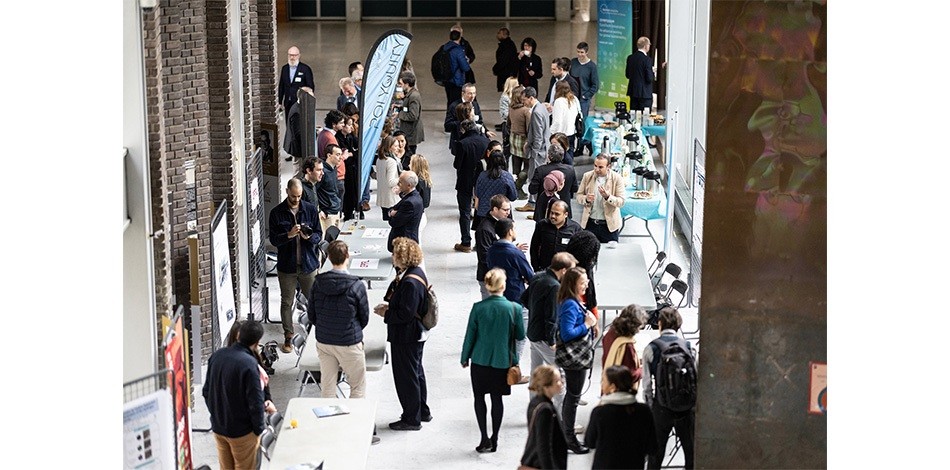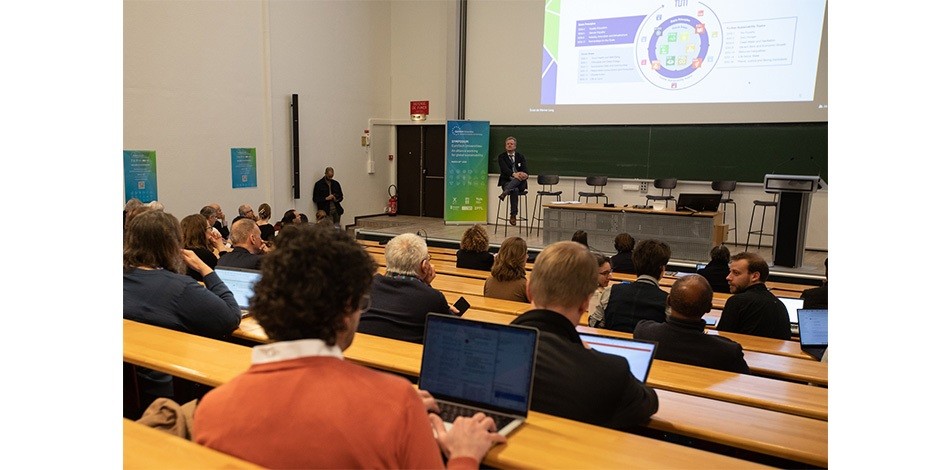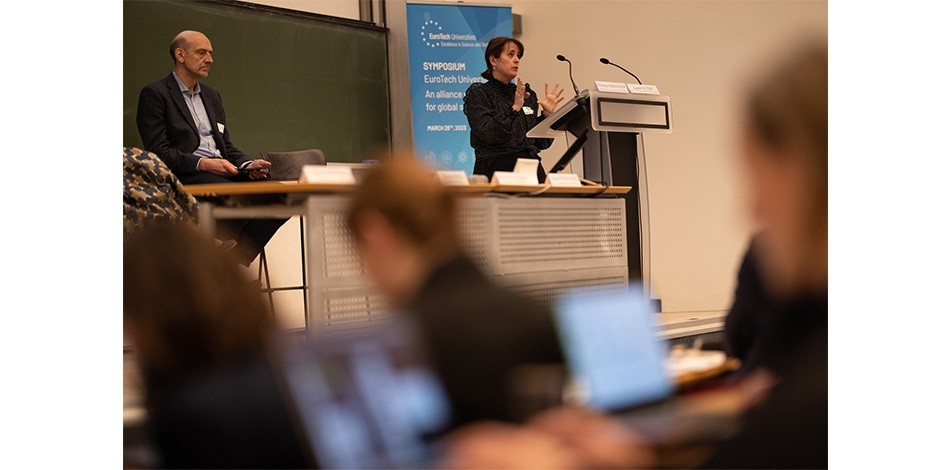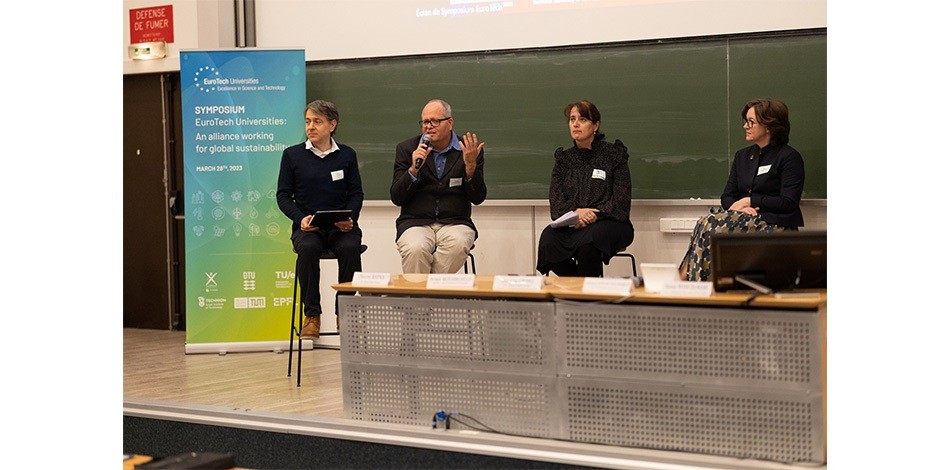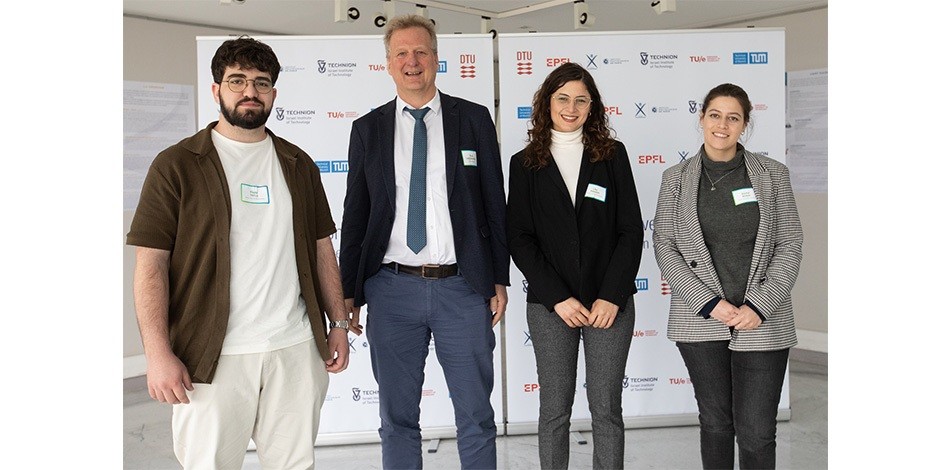École Polytechnique hosts EuroTech Alliance symposium on Sustainability

The symposium "EuroTech Universities: An alliance working for global sustainability" took place at École Polytechnique on March 28, 2023, uniting leaders and scientists from the European alliance's six partner universities to discuss their institutions' initiatives and a joint action plan to accelerate the shift towards absolute sustainability.
“With this symposium, we once again reaffirm our commitment to addressing environmental issues, to establish collaborative partnerships to facilitate interdisciplinary research, to share knowledge, to foster innovation, and to bring new solutions,” stated Éric Labaye, President of École Polytechnique and President of the EuroTech Universities Alliance for the period 2022-2023, and added: “As European higher education institutions, we are committed to educating all our students so that they fully understand and take the full measure of the complex climatic, economic and social issues at stake.”
Throughout the day, several panel discussions focused on different aspects of the crucial topic. Each of the six universities presented its strategy and actions to enhance and further develop sustainable approaches. The speakers also discussed the challenges and hurdles institutions will likely encounter as they work on the ecological transition. Furthermore, the panelists also examined to which extent new technologies can provide solutions, stressing that a holistic understanding of Sustainability requires understanding and addressing its complex connections with society.
The EuroTech Universities Alliance brings together six leading European universities of science and technology dedicated to excellence in research and education: École Polytechnique, the Technical University of Denmark (DTU), École polytechnique fédérale de Lausanne (EPFL), the Eindhoven University of Technology (TU/e), the Technical University of Munich (TUM), and the Technion - Israel Institute of Technology. This strategic partnership aims to foster joint research projects on a European scale in priority areas such as artificial intelligence, sustainable development, health, and bio-engineering and to train international talents to contribute and drive change, be it in research, entrepreneurship, industry, or society.
United for Sustainability
In his opening speech of the symposium, Eric Labaye emphasized École Polytechnique's commitment to sustainable development. The measures the School announced at its conference "RéfleXions" in 2019 are today reflected in École Polytechnique's Climate Plan, which drives the ecological transformation of the School. With the publication of its Climate Plan in January 2022, the School has placed sustainable development at the center of its main missions: education, research, and innovation, Eric Labaye stressed.
Moderated by Kees van der Beek, Vice-Provost for Research at École Polytechnique, the symposium’s first panel discussion invited the delegates in charge of the ecological transition at each of the six universities to take stock of this area. The discussions then focused on the meaning of sustainability, the objectives and ambitions pursued, but also the limits that may be encountered.
“Teams from many laboratories, interdisciplinary research centers and academic chairs within the EuroTech Universities Alliance are directly involved in sustainable development issues. We are therefore ideally placed to, together, drive innovation, to support the emergence of breakthrough solutions and harness new findings and discoveries for the green transition. In increasing knowledge and educating future generations, the academic world bears a specific responsibility in this respect”, stressed Kees van der Beek, Vice-Provost for Research at École Polytechnique.
The conference invited the panelists to showcase to most promising initiatives implemented on the campuses of the six partner universities across Europe, as also the latest findings of their research groups and centers dedicated to sustainability. Among the initiatives driven in this domain at École Polytechnique, were notably presented the interdisciplinary center E4C (Energy4 Climate) operated by Institut Polytechnique de Paris, which addresses the systemic complexity of the energy transition, the chair "Technology for Change", and the School's climate plan.
Subsequently, the panelists discussed the best ways to involve the entire academic community - be it faculty, students, or staff - in sustainability initiatives and to make them consider, for each project, its impact with regard to sustainability.
The symposium also highlighted the achievements of students and doctoral students and their associations, who play a key role in the transition to sustainability. Indeed, several students and PhD students from the six institutions presented their projects to the public.
Finally, the debate focused on the means to involve all stakeholders in the pursuit of achieving sustainability and on necessary new skills to include in the education of current and future engineers to equip them best to advance the ecological transition.
 Support l'X
Support l'X 